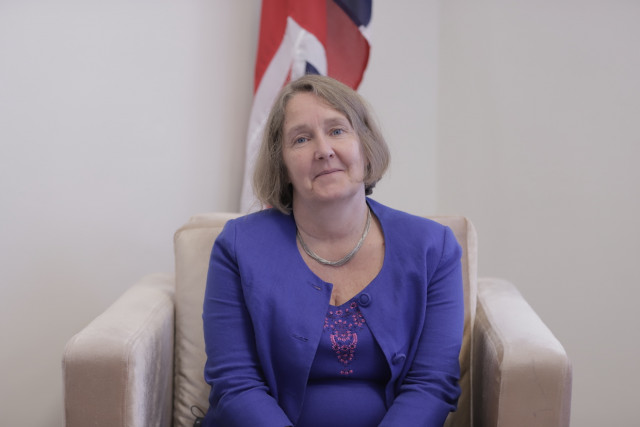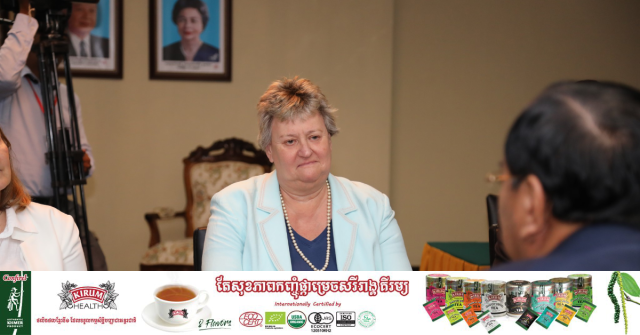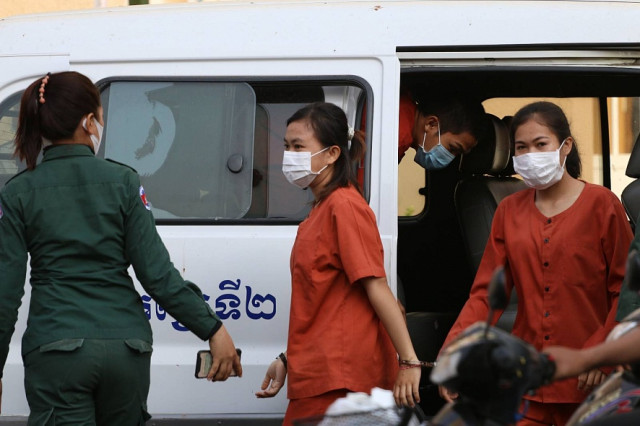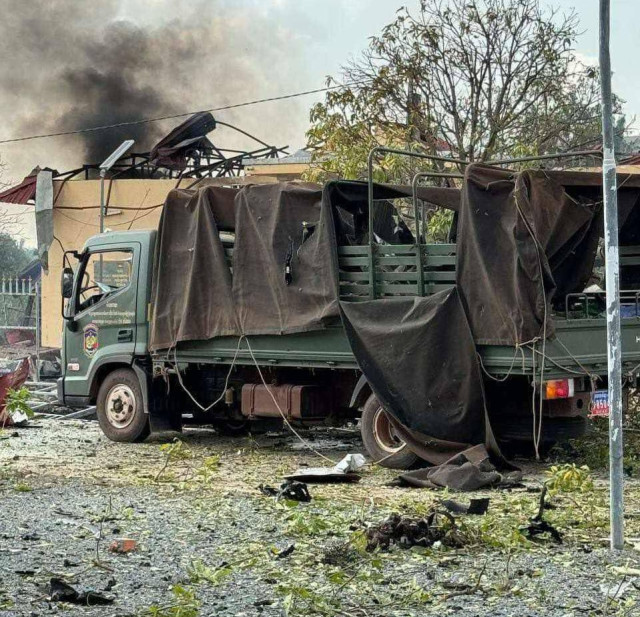British Government’s Support for Cambodia’s Climate Actions

- Sao Phal Niseiy
- December 4, 2020 9:43 AM
The British government has provided Cambodia with support through a series of projects aimed at tackling and minimizing climate disasters, British ambassador says.
PHNOM PENH--British Ambassador to Cambodia Tina Redshaw believes that Cambodia has been taking the climate crisis seriously while young people in the country are becoming more thoughtful about environmental wellbeing.
With climate action being the centerpiece of the United Kingdom’s (UK) foreign policy, many countries are looking at the UK’s upcoming chairmanship of the 26th Conference of the Parties (COP) to be held in November 2021 as well as the UK’s ability to mobilize financial support to assist developing countries.
During an exclusive interview on Nov. 20, British Ambassador Tina Redshaw explained the UK’s ongoing support of Cambodia’s climate actions as the country becomes increasingly vulnerable to the climate breakdown.
According to the ambassador, the support provided by the UK government ranges from financing to technical consultation.
“It is not only about projects and financing, but it is also about support and discussions with the relevant government ministries [in Cambodia],” Redshaw said. The British government has dedicated climate-change policy officers who regularly discuss with the relevant stakeholders at the Ministry of Environment.
“[This is] to find out more about Cambodia’s climate change ambition,” she said. “[A]t the moment, Cambodia is going through the consultation on development of the renewal of the National Determined Contribution and we have been talking closely with the team to find out what that means.”
In terms of projects, Redshaw said that financial assistance has been provided by a number of departments of the UK government.
This includes, she said, the Green Climate Fund, which allocates funding for some climate-friendly agribusiness through policies and value chain development.
“[We] see agriculture as one of the areas that gets very hard hit by any change in climate and, of course, the recent floods,” she said.
In addition, Redshaw said, there are other climate investment funds through which Cambodia has been able to draw on in order to invest and build specific institutional capacity.
This will enable the country to entrench climate policy, which might include the issues around climate resilience, into the development plan, climate briefing, the water management system as well as rural infrastructures into a conventional climate policy across different ministries, she said.
Cambodia takes climate crisis very seriously
Cambodia has been listed as one of the most vulnerable countries to climate change with people experiencing frequent extreme weather events, including drought and floods.
Therefore, building capacity to mitigate the impacts and stepping up climate action have now become more critical than ever for developing countries such as Cambodia.
According to Ambassador Redshaw, the Cambodian government isnow really attaching importance to climate change with more government agencies working on policies and actions that can build up climate adaptation and resilience. “I think, along with many other countries across the region, Cambodia is looking very seriously at [what] it needs to do, what policy it needs to bring in across the whole sway of activities.
“The issue around lowering emission, adaption and resilience is something that the Ministry of Environment has talked about a lot,” she said.
As Cambodia has been hard hit by recent flooding, and more extreme climate events will jeopardize one of the main driving forces of the country’s economy, the ambassador said that intensifying effort to tackle impacts driven by climate crisis is requisite.
“As still a main, majorly agricultural economy, it is really important that everything that can be done is done to ensure the integrity of the agricultural economy,” she said.
Growing awareness of environmental wellbeing among Cambodian younger generations
When asked how she viewed environmental awareness among the Cambodian population, Redshaw responded that it is difficult to make an overall assessment but acknowledged that more and more young Cambodians value the environment. “I don’t know how much awareness across the whole population is, but I think you do see quite a lot of awareness in young people.
“You can see that from young people joining in activities that might not appear to be necessarily directly about climate change, but young people are interested in the environment,” she said.
More specifically, young Cambodians want to ensure that plastic pollution decreases as they don’t want forests to disappear or the weather to get so bad that their activities cannot be enjoyed, Redshaw said.
More work needs to be done to ensure a behavioral change on climate
In order to address the climate crisis, drastic changes are required, including action taken by each individual to reduce the carbon footprints. But emboldening a change in action will be extremely arduous.
Based on the UK’s own experience, Redshaw suggested that, in order to achieve a behavioral change, it is imperative that people receive both incentives and education on climate-related issues.
“I think the governments’ policies that incentivize people to reduce emission are important,” she said. “That might be increasing the use of public transports, increasing walking and cycling to work instead of jumping in a car.”
Redshaw went on to recall the UK government’s new Green Industrial Revolution in which one of the points is to bring forward the ban on the sale of diesel and petrol cars from 2035 to 2030.
This can be a lesson that developing countries such as Cambodia can take into consideration when it comes to stepping up the effort to cut down carbon emissions, she continued.
Besides government policies, the ambassador said that broader access to information for people and promoting education on climate issues will also play a part in making this change a reality.
“I think that people need education, access to information about what climate change is, how it is affecting planet as a whole if we don’t make changes,” Redshaw explained.
Post Pandemic Time: transiting toward a green future through clean energy
Cambodia’s capacity and ability to rapidly move forward with clean technology in energy generation will be critical for its sustainable future. However, Cambodia currently still remains largely reliant on filthy fossil fuel such as coal.
As the world recovers from the pandemic, it is anticipated that the energy demand will again continue to rise, which requires the government to diversify energy sources in order keep pace with the demand, according to the ambassador.
“That are the challenges for the government: to provide the energy that its citizens and the businesses expect at the same time as introducing renewables,” Redshaw said.
Despite these challenges, she stressed that Cambodia can continue to embrace solar power as it has been proven that solar farms can get built very quickly and provide electricity fast at lower cost than coal.
According to Redshaw, there are a number of opportunities that the UK is working on with Cambodia including inviting Cambodia onto an energy transition council: an alliance of countries that support each other to look at transiting away from dirty fuel.
Acknowledging that a renewable energy source such as solar energy always comes with issues of connectivity, transmission and shorter duration of electricity generation, the ambassador suggested that developing countries need to find a balance by increasing the percentage of renewable technology and energy generation into the mix.
In addition to establishing the energy mix, Redshaw said that making battery technology available at a lower price is going to be critical if the world is to see a real increase in solar power.
“Battery technology still is a bit limited,” she said. “[B]ut again, we have seen the price of solar drop so rapidly that I am very confident that we will also see the price of battery technology dropping.
“And I think this will make a huge change in developing countries’ ability so that they can afford to turn their back on coal,” Redshaw said.















